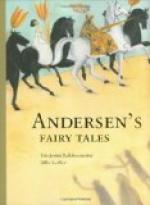“No,” answered the theologian of the time of King Hans: “that book is not written by a Heiberg, but was imprinted by Godfrey von Gehmen.”
“Oh, is that the author’s name?” said the Councillor. “It is a very old name, and, as well as I recollect, he was the first printer that appeared in Denmark.”
“Yes, he is our first printer,” replied the clerical gentleman hastily.
So far all went on well. Some one of the worthy burghers now spoke of the dreadful pestilence that had raged in the country a few years back, meaning that of 1484. The Councillor imagined it was the cholera that was meant, which people made so much fuss about; and the discourse passed off satisfactorily enough. The war of the buccaneers of 1490 was so recent that it could not fail being alluded to; the English pirates had, they said, most shamefully taken their ships while in the roadstead; and the Councillor, before whose eyes the Herostratic* event of 1801 still floated vividly, agreed entirely with the others in abusing the rascally English. With other topics he was not so fortunate; every moment brought about some new confusion, and threatened to become a perfect Babel; for the worthy Bachelor was really too ignorant, and the simplest observations of the Councillor sounded to him too daring and phantastical. They looked at one another from the crown of the head to the soles of the feet; and when matters grew to too high a pitch, then the Bachelor talked Latin, in the hope of being better understood—but it was of no use after all.
* Herostratus, or Eratostratus—an Ephesian, who wantonly set fire to the famous temple of Diana, in order to commemorate his name by so uncommon an action.
“What’s the matter?” asked the Hostess, plucking the Councillor by the sleeve; and now his recollection returned, for in the course of the conversation he had entirely forgotten all that had preceded it.
“Merciful God, where am I!” exclaimed he in agony; and while he so thought, all his ideas and feelings of overpowering dizziness, against which he struggled with the utmost power of desperation, encompassed him with renewed force. “Let us drink claret and mead, and Bremen beer,” shouted one of the guests—“and you shall drink with us!”
Two maidens approached. One wore a cap of two staring colors, denoting the class of persons to which she belonged. They poured out the liquor, and made the most friendly gesticulations; while a cold perspiration trickled down the back of the poor Councillor.
“What’s to be the end of this! What’s to become of me!” groaned he; but he was forced, in spite of his opposition, to drink with the rest. They took hold of the worthy man; who, hearing on every side that he was intoxicated, did not in the least doubt the truth of this certainly not very polite assertion; but on the contrary, implored the ladies and gentlemen present to procure him a hackney-coach: they, however, imagined he was talking Russian.




